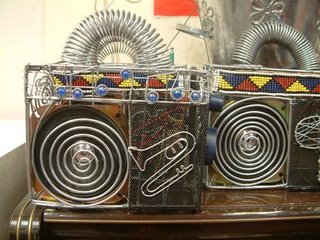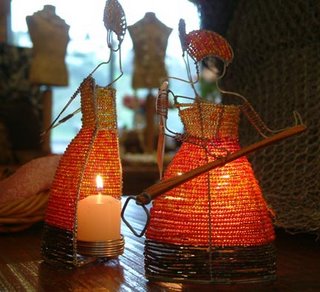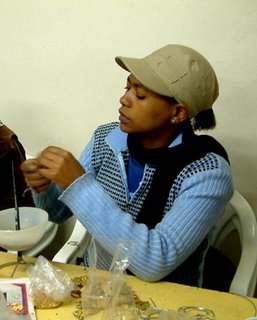Wired to the Streets

The offices of Streetwires are a creative, colourful domain. On the ground floor, a workshop, where teams of artists bend, mould and bead wire into the most amazing transformations. On the first floor, a design team, where more experienced and skilled artists get to innovate new designs and styles. Beside them, a shop, where products are displayed and sold. Beside that again, a team of administrators and marketing personnel who keep the business motoring.
In between all of that you will find Patrick Schofield, co-founder of Streetwires, a man with an incredible mind and heart, who has poured his passion and business acumen into making the whole thing happen, keeping it going, and making it work.
It has been six years in the making. What started out as a team of 3, now is in excess of 150. In that time, Streetwires has helped to rejuvenate the whole wire art industry and put a quality stamp on their work.
Patrick explained the evolution of the business idea to me.
‘Streetwires was started when myself and a good friend, Douglas, were looking at the preservation of African culture through music, developing a concept called Ipi Africa. An arm of that was to look at social development around music. One of the wire artists around Cape Town had become friendly with Douglas, and had started making wire radios- a little electronic circuit around a wire beaded frame. Douglas came running to me and said, “you have to see this, this is incredible. It links in so well with what we want to do with culture, coming though craft, though music”.
I had seen what extraordinary effects craft had had in the development of Zimbabwe (where Patrick is from). Zimbabwe was initially a fairly segregated society, and as tourism developed, I saw how craft became a major income generator and a way of bringing traditional heritage into contemporary society, and, in that way was preserving cultural heritage. That linked into what we had been looking at on the music side, and we realised how craft could do that as well. Looking at what the street artists were doing, I saw huge potential for bringing in those traditional craft influences into society, where you can create contemporary craft and generate sustainable income for people living in today’s world”.

Streetwires now employs local workers from the townships, and provides an environment in which they can earn a steady income- and develop a sense of community. The business is a platform to showcase and nurture talent in the townships, and in return each artist gets a fair price for each piece that they produce. Those with talent are encouraged to develop it. On the day after I arrived in Cape Town, I was taken to an exhibition where Streetwire artists were given central stage- and rightly so. Their work is outstanding.

Patrick talks enthusiastically about his work, and is always looking for new ideas. The entrepreneurial streak has been in him for early on, starting his first business, a local ‘what’s on’ magazine at the age of 22. Along the way he learned core skills; management, leadership, and essentially, delegation. I have seen him at work- he let’s those with the creative talent get on with it, those with marketing flair get on it with. All the while he keeps business ideas coming in, and an eye on finances.
I stayed with Patrick while in Cape Town, and was blown away by his generosity, kindness and the friendship that he extended- and am very grateful for his hospitality.
Thanks Padraig (he’ll hate me for calling him that!)



0 Comments:
Post a Comment
<< Home